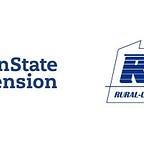Friday On The Farm ~ 8/13/2021
The Other End Of The Dairy Cycle ~ CHEESE!!
Few foods inspire dedication quite like cheese. Turophiles; that’s the word for people who love cheese. Can I tell you a secret? I’m not one of them. Animals make me happy. I respect farmers. I enjoy cooking. I am from Pennsylvania. Cheese is at the intersection of all of these things. So I’m starting a cheese shop to primarily highlight Pennsylvania cheese and introduce my customers to the bounty of food that is made in Pennsylvania.
Why Pennsylvania cheese? There are a few basic ‘ingredients’ that allow for a strong dairy industry; fertile soil, clean water, hospitable climate, strong animal genetics, industry infrastructure, and people. We have those things in Pennsylvania and it shows in the quality of the cheese we produce. Every ingredient plays a part in making delicious and nutritious natural cheeses with a unique flavor. The French call it “terroir” but it’s easier to think of it as “taste of place.” Regardless of the type of cheese, the base flavor of Pennsylvania cheese is rich and grassy with an obvious minerality on the finish (yes, that’s a word).
The artisan, farmstead and specialty cheesemaking is a huge opportunity for our state’s dairy and tourism industries. In the conventional dairy industry system (cows), dairy farmers are price takers who work hard to care for their animals and the land but often do not make a profit. Pricing of milk is a complex system but in short, standardized milk is seen as a basic food necessity which means the price is often kept low so that it’s affordable for everyone. Over the past decade, Pennsylvania has lost dairy farms by the hundreds each year as farmers decide it’s no longer profitable to work and worry so much. That’s a shame because our state has such a rich history and culture of dairy farming. It’s a widely accepted theory that the best way to save these family farms and keep them producing food is to provide resources that encourage innovation and value-added production (e.g. cheesemaking, processing ice cream). There’s also a huge opportunity for goat and sheep farmers to get on board and many have. Resources have been directed to support these efforts through government agencies across the state and we are seeing an increase in the number and quality of successful cheesemaking businesses.
I currently work with 11 cheesemakers who produce an average of five cheeses each, giving me access to about 55 unique cheeses. I have to clear up a big misunderstanding: I do not process cheese. Why would I when there are so many skilled cheesemakers already making delicious cheese across our state? You may have heard of some of them; Keswick Creamery, Caputo Brothers Creamery, Valley Milkhouse Creamery and Alpine Heritage Creamery are just a few of the makers from whom I source. There are about 20 other cheesemakers across the state that I have on my list to source from in the future. There are a million little challenges in making cheese, not to mention the marketing and retailing struggles that cheesemakers must conquer just to sell their cheese.
At this point in my business, I spend a lot of time traveling to pick up cheese and forming relationships with the cheesemakers. Small batch cheesemaking does not have a wholesale shipping infrastructure. Cheese is a heat-sensitive food and commercial shipping adds a huge, unknown risk. The cheesemakers put a lot of time into carefully turning fluid milk into an amazingly versatile food. They need to know that I’m a person they can trust to care for their cheese and represent their business to the end consumer. This regular interaction gives me a chance to get a feel for who they are as a person and how that impacts their cheese. It’s the most thrilling experience in my world when I can introduce a customer to a Pennsylvania cheesemaker with conversation and a taste of cheese.
About the Author: In 2019, Stephanie Roscinski started Central Wedge Cheese Shop, a small business that sells Pennsylvania-produced farmstead and artisan cheeses. Currently, she operates the business out of Beeman’s Baked Goods in Carlisle, Pa. She also works part time in the bakery, a family business owned by her sister and mother. Her long-term goal for the cheese shop is to open a retail location that hosts special events and cheese-related classes.
